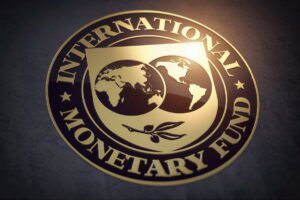
Global economic growth will slow down in 2024, according to more than half (56%) of chief economists surveyed at the World Economic Forum (WEF) in Davos.
The remaining respondents expect global GDP growth to remain at the level of 2023 or accelerate.
According to the International Monetary Fund, the global economy will grow by 2.9% in 2024 after growing by 3% in 2023.
Economists are most pessimistic about Europe – three-quarters of respondents (77%) believe that growth in the region will be weak or very weak. Meanwhile, 93% of respondents expect moderate or strong growth in South Asia, and 86% in East Asia.
The US GDP growth rate will range from moderate to strong, according to 56% of the surveyed chief economists. Back in September, the percentage was 78%. At the same time, only 13% expect high inflation in the United States and Europe.
The WEF organizers interviewed 30 chief economists from banks, consulting firms, international organizations and major companies, including Microsoft and Google.
“The global economy will be tested again this year,” said WEF Managing Director Saadia Zahidi. – “Global inflation is easing, but economic growth is stalling, financial conditions remain tight, tensions are rising, and inequality is growing, underscoring the urgent need for international cooperation to create the conditions for sustainable and inclusive economic growth.
For more information on the situation in the Ukrainian and global economy, please see the video on the YouTube channel of the Club of Experts at the link:
You can subscribe to the channel here: https://www.youtube.com/@ExpertsClub

For the second time in a year, the International Monetary Fund (IMF) worsened its forecast for global economic growth in 2022 – to 3.2% from 3.6% (4.4% growth was expected in January). For 2023, the estimate has been lowered to 2.9% from the 3.6% growth expected in April (in January, the IMF forecast global GDP growth of 3.8%).
Such an assessment is given in the World Economic Outlook Update: Gloomy and more uncertain, published by the IMF on Tuesday.
The IMF lowered the growth forecast for the economies of emerging market and developing countries for 2022 to 3.6% from 3.8%, for 2023 – to 3.9% from 4.4%.
The growth forecast for China’s economy this year has been significantly reduced to 3.3% from 4.4% (in January, an increase of 4.8% was expected), in 2023 to 4.6% from 5.1%.
India’s GDP growth estimate is also downgraded to 7.4% from 8.2% in 2022 and to 6.1% from 6.9% in 2023, respectively.
At the same time, the growth forecast for the Brazilian economy has been raised to 1.7% from 0.8% in 2022 and lowered to 0.9% from 1.4% in 2023.
The forecast for GDP growth in developed countries in 2022 is downgraded by 0.8 percentage points to 2.5% and by 1 p.p. – up to 1.4% – in 2023.
There is also a serious reduction in the forecast for US GDP growth: in 2022 – by 1.4 p.p. to 2.3%, in 2023 – by 1.3 p.p. up to 1%.
The economy of the eurozone countries this year, according to the IMF, will grow by 2.6%, which is 0.2 percentage points. less than the previous forecast. For 2023, the estimate deteriorated more significantly – an increase of 1.2% compared to the previously expected 2.3%.
The forecast for Italian GDP growth in 2022 was raised to 3% from 2.3%, in 2023, on the contrary, it was reduced to 0.7% from 1.7% (was 2.2%). The forecast for Spain for the current year is reduced by 0.8 percentage points. – up to 4% and by 1.3 p.p., up to 2% in 2023
The German economy in 2022 will grow, according to the IMF, only by 1.2%, previously expected to grow by 2.1%, in 2023 growth will slow down to 0.8% compared to the previous forecast of 2.7%.
For France, the assessment has been reduced for the current year by 0.6 percentage points. – up to 2.3% and by 0.4 p.p. for 2023 – up to 1%.
The UK economic growth forecast for 2022 is reduced by 0.5 p.p. – up to 3.2%, for 2023 – by 0.7 p.p. – up to 0.5%. Japan’s GDP is expected to grow by 1.7% in 2022-2023 (down 0.7 percentage points this year and 0.6 percentage points next).
The fund improved its assessment of the dynamics of the Russian economy in 2022, expecting it to fall by 6%, and not by 8.5%, as predicted in April. At the same time, the forecast for 2023 has worsened: according to the Fund, the decline in the RF GDP will be 3.5% compared to the previous forecast of 2.3%. In January, the Fund predicted the growth of the Russian economy in 2022 by 2.8%, in 2023 – by 2.1%.
The IMF states: the risks for the updated global forecast are overwhelmingly shifted to the downside. A war in Ukraine could lead to a sudden halt in gas imports from Russia to Europe; slowing down inflation may prove more difficult if labor market deficits exceed expectations or inflation expectations cannot be anchored; tightening conditions in the global financial market is fraught with debt crises in developing countries; new outbreaks of COVID-19 and lockdowns, coupled with further escalation of problems in the real estate sector, could further slow China’s growth; geopolitical fragmentation could hinder the development of world trade, the IMF lists risk factors. In an alternative forecast scenario in which these risks materialize, global GDP growth will slow down to 2.6% and 2% in 2022 and 2023. respectively.

More and more investors are pessimistic about the prospects for the global economy and corporate profits, according to the results of a monthly survey of fund managers conducted by Bank of America Corp. (BofA).
According to the results of the July survey, the proportion of respondents who expect the economy to weaken in the next 12 months reached a record 79%, an increase of 6 percentage points (p.p.). The share of investors expecting corporate earnings to worsen over the next 12 months rose by 7 percentage points, also reaching 79%.
Stagflation in the global economy is expected by a record 90% of respondents compared to 83% a month earlier.
The survey, which included 259 investors managing $722 billion in assets, was conducted by BofA last week.
Investors have reduced exposure to risky assets to lows not seen even during the global financial crisis, “completely capitulating” in the face of a bleak economic outlook, BofA said.
The share of stocks in investment portfolios this month fell to the lowest since the collapse of investment bank Lehman Brothers in 2008, the share of cash balances reached 6.1%, the highest since October 2001.
Among the biggest risks, fund managers point to high inflation, a global recession, and a hawkish central bank.
At the same time, the proportion of respondents who expect inflation to slow down next year has reached its highest level since the global financial crisis.
BofA has been conducting surveys of fund managers since 1994.